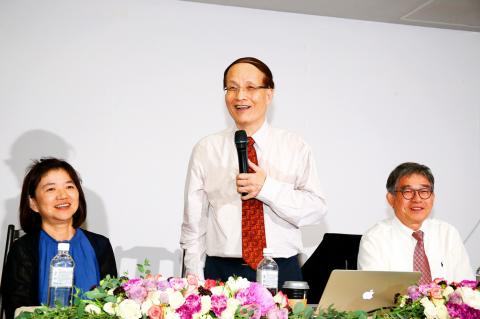The National Palace Museum (NPM) should reflect the history of East Asia from a Taiwan-
centric perspective to make it more relatable to Taiwanese, instead of allowing it to remain “a Chinese enclave,” newly inaugurated museum Director Chen Chi-nan (陳其南) said yesterday.
“Ask an Aborigine, a direct descendant of the earliest inhabitants of this land, to visit the museum and tell you if they feel the museum represents them, and none of them will say it does. The museum as it is now is a Chinese enclave and not a part of Taiwan,” Chen told a news conference in Taipei a day after his inauguration.

Photo: Chen Yi-kuan, Taipei Times
His vision is to transform it into a Taiwanese museum by reinterpreting the objects on display and curating its exhibitions in a way that tells the history of East Asia from a Taiwanese perspective, he said.
The museum’s most famous artifacts had been transported to Taiwan by the Chinese Nationalist Party (KMT) government during the Second Sino-Japanese War, he said.
“Due to this historical coincidence, it has now become our responsibility to protect and preserve them. How much we value ancient civilizations is unrelated to their modern successors,” he said, adding that the cultural assets should be cherished, regardless of one’s political views.
Museums should be inclusive, which is why some of the finest artifacts from ancient Greece are housed in the UK and Germany, he said.
The NPM should follow the example of the British Museum in diversifying its exhibitions and celebrating cultural assets from other ancient civilizations, he said.
If granted a large enough budget, Chen said he hopes to expand the museum’s southern branch in Chiayi County to house exhibitions depicting Taiwan’s relations with other countries throughout history, such as Spain, Portugal and the Ryukyu Kingdom, he said.
“The problem with the southern branch is its location, which is not close to any urban area. We must have exhibitions on a wide range of themes that would take more than one day to see to attract visitors to go [out of their way to the museum],” he added.
While the National Palace Museum has stepped up its marketing efforts to target younger people, Chen said he would work to find the perfect balance between preserving tradition and appealing to young people.
“We will not go back to the old, traditional ways of promoting the museum, but we will not turn it into an amusement park just to attract visitors either,” he said.
When asked if the museum would consider collaborating with Beijing’s Palace Museum, Chen said: “We are happy to cooperate, if they are willing.”
However, Beijing might not be open to working with him because of his political views, he said.

The CIA has a message for Chinese government officials worried about their place in Chinese President Xi Jinping’s (習近平) government: Come work with us. The agency released two Mandarin-language videos on social media on Thursday inviting disgruntled officials to contact the CIA. The recruitment videos posted on YouTube and X racked up more than 5 million views combined in their first day. The outreach comes as CIA Director John Ratcliffe has vowed to boost the agency’s use of intelligence from human sources and its focus on China, which has recently targeted US officials with its own espionage operations. The videos are “aimed at

STEADFAST FRIEND: The bills encourage increased Taiwan-US engagement and address China’s distortion of UN Resolution 2758 to isolate Taiwan internationally The Presidential Office yesterday thanked the US House of Representatives for unanimously passing two Taiwan-related bills highlighting its solid support for Taiwan’s democracy and global participation, and for deepening bilateral relations. One of the bills, the Taiwan Assurance Implementation Act, requires the US Department of State to periodically review its guidelines for engagement with Taiwan, and report to the US Congress on the guidelines and plans to lift self-imposed limitations on US-Taiwan engagement. The other bill is the Taiwan International Solidarity Act, which clarifies that UN Resolution 2758 does not address the issue of the representation of Taiwan or its people in

US Indo-Pacific Commander Admiral Samuel Paparo on Friday expressed concern over the rate at which China is diversifying its military exercises, the Financial Times (FT) reported on Saturday. “The rates of change on the depth and breadth of their exercises is the one non-linear effect that I’ve seen in the last year that wakes me up at night or keeps me up at night,” Paparo was quoted by FT as saying while attending the annual Sedona Forum at the McCain Institute in Arizona. Paparo also expressed concern over the speed with which China was expanding its military. While the US

SHIFT: Taiwan’s better-than-expected first-quarter GDP and signs of weakness in the US have driven global capital back to emerging markets, the central bank head said The central bank yesterday blamed market speculation for the steep rise in the local currency, and urged exporters and financial institutions to stay calm and stop panic sell-offs to avoid hurting their own profitability. The nation’s top monetary policymaker said that it would step in, if necessary, to maintain order and stability in the foreign exchange market. The remarks came as the NT dollar yesterday closed up NT$0.919 to NT$30.145 against the US dollar in Taipei trading, after rising as high as NT$29.59 in intraday trading. The local currency has surged 5.85 percent against the greenback over the past two sessions, central